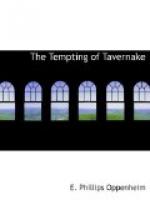A week later Tavernake was in London. A visit to his friend Mr. Martin had easily proved the truth of Pritchard’s words, and he found himself in possession of a sum of money at least twice as great as he had anticipated. He stayed at a cheap hotel in the Strand and made purchases under Pritchard’s supervision. For the first few days he was too busy for reflection. Then Pritchard let him alone while he ran over to Paris, and Tavernake suddenly realized that he was in the city to which he had thought never to return. He passed the back of the theatre where he had waited for Beatrice, he looked up at the entrance of the Milan Court; he lunched alone, and with a curious mixture of feelings, at the little restaurant where he had supped with Beatrice. It was over, that part of his life, over and finished. Yet, with his natural truthfulness, he never attempted to disguise from himself the pain at his heart. Three times in one day he found himself, under some pretext or another, in Imano’s Restaurant. Once, in the middle of the street, he burst into a fit of laughter. It was while Pritchard was in London, and he asked him a question.
“Pritchard,” he remarked, “you area man of experience. Did any one ever care for two women at the same time?”
Pritchard removed his cigar from his teeth and stared at his companion.
“Why, my young friend,” he replied, “I’ve found no trouble myself in being fond of a dozen.”
Tavernake smiled and said no more. Pritchard was one of the good fellows of the world, but there were things which were hidden from him. Yet Tavernake, who had fallen into a habit, during his solitude, of analyzing his sensations, was puzzled by this one circumstance, that when he thought of Elizabeth, though his heart never failed to beat more quickly, the sense of shame generally stole over him; and when he thought of Beatrice, a curious loneliness, a loneliness that brought with it a pain, seemed suddenly to make the hours drag and his pleasures flavorless. For two days he was puzzled. Then his habit of taking long walks helped him toward a solution. In a small outlying music-hall in the east-end of London, he saw the same announcement that he had noticed in the Norfolk newspaper,—“Professor Franklin” in large type, and “Miss Beatrice Franklin” in small.
That night he attended the music-hall. The scene was practically a repetition of the one in Norwich, only with additions. The professor’s bombastic performance met with scarcely any applause. Its termination was, indeed, interrupted by catcalls and whistles from the gallery. Beatrice’s songs, on the other hand, were applauded more vociferously than ever. She had hard work to avoid a third encore.
At the end of the performance, Tavernake made his way to the stage-door and waited. The neighborhood was an unsavory one, and the building itself seemed crowded in among a row of shops of the worst order, fish stalls, and a glaring gin palace. Long before Beatrice came out, Tavernake could hear the professor’s voice down the covered passage, the professor’s voice apparently raised in anger.




